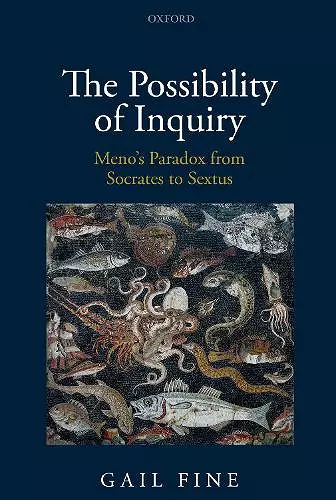The Possibility of Inquiry
Meno's Paradox from Socrates to Sextus
Format:Paperback
Publisher:Oxford University Press
Published:1st Oct '18
Currently unavailable, and unfortunately no date known when it will be back
This paperback is available in another edition too:
- Hardback£110.00(9780199577392)

Gail Fine presents an original interpretation of a compelling puzzle in ancient philosophy. Meno's Paradox, which is first formulated in Plato's Meno, challenges the very possibility of inquiry. Plato replies with the theory of recollection, according to which we all had prenatal knowledge of some range of things, and what we call inquiry involves recollecting what we previously knew; he also illustrates this with his famous cross-examination of an untutored slave about a geometry problem, whose solution the slave is able to discover through inquiry. Hence, contrary to the paradox, inquiry is possible after all. Plato is not the only philosopher to grapple with Meno's Paradox: so too do Aristotle, the Epicureans, the Stoics, and Sextus. How do their various replies compare with one another, and with Plato's? How good are any of their replies? In a fascinating fragment preserved in Damascius' Commentary on the Phaedo, Plutarch briefly considers these questions (though for obvious chronological reasons he doesn't discuss Sextus). But Fine's book is the first full-length systematic treatment of the paradox and responses to it. Among the topics discussed are the nature of knowledge; how knowledge differs from mere true belief; the nature of inquiry; varieties of innatism; concepts and meaning; the scope and limits of experience. The Possibility of Inquiry will be of interest to anyone interested in ancient epistemology, in ancient philosophy, or in epistemology.
Gail Fine's excellent book is a rich and sophisticated examination of an ancient epistemological puzzle first stated in Plato's Meno . . . This book is an example of philosophically informed scholarship at its very best. It is essential reading for anyone with interests in any aspect of ancient epistemology. * David Bronstein, Mind *
ISBN: 9780198822646
Dimensions: 235mm x 163mm x 23mm
Weight: 622g
414 pages